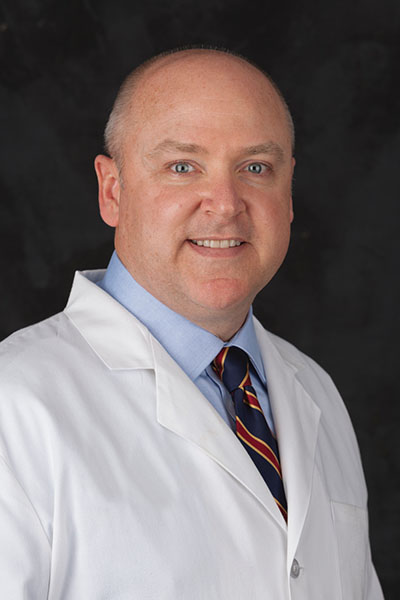Are My Symptoms Caused by Stomach Cancer or Something Else?
April 3, 2025
While stomach cancer affects fewer Americans today than a decade ago, the American Cancer Society reports that more than 30,000 Americans will be diagnosed this year alone. Early detection opens the door to more options for cancer care.
Also known as gastric cancer, stomach cancer has risk factors that cannot be avoided. The disease affects more men than women and is most common after age 65. Pay attention to what your body is telling you to increase the odds of an early diagnosis.
“Symptoms of stomach cancer can help lead to an early diagnosis if you know what to look for,” says Dr. Richard P. Stewart, board-certified gastroenterologist and internal medicine specialist with Beaufort Memorial Lowcountry Medical Group Specialty Care. “However, these symptoms can be tricky. They often mimic other conditions, tempting you to ignore or write them off.”
Read More: Whatever Your Cancer Journey Brings, Let’s Navigate It Together
Stomach Cancer Symptoms
Stomach cancer rarely causes noticeable signs or symptoms in its early stages. As a result, the cancer may grow quietly, spreading to nearby organs and tissues before you realize it’s there.
When symptoms do arise, they may include the following:
- Abdominal discomfort, pain or swelling
- Bloody stool that may appear black or dark brown
- Difficulty eating due to a poor appetite or feeling full quickly
- Heartburn or indigestion
- Nausea or vomiting (vomit may be bloody)
- Weakness or tiredness due to anemia
- Weight loss with no known cause
Read More: Is Colon Cancer Hereditary? Know Your Risk and What to Do About It
Similar Symptoms, Different Conditions
Troubling as these symptoms are, they aren’t always rooted in stomach cancer. Many other gastrointestinal conditions can bring on the same symptoms.
- Abdominal pain has many causes, ranging from constipation and food intolerances to ulcers, urinary tract infections and inflammatory bowel disease. Swelling may indicate weight gain, ovarian cancer or other health issues.
- Blood in stool occurs with hemorrhoids, anal fissures and other types of cancer.
- Appetite loss can be related to several mental and physical issues. Depression or grief can make it difficult to eat much, as can heart failure and kidney disease. Medications, including codeine and chemotherapy, can also reduce your appetite.
- Heartburn and indigestion often occur after eating specific foods or drinking alcohol.
- Nausea and vomiting may accompany food poisoning, migraines, motion sickness and other common conditions.
- Anemia may be the result of not getting enough iron and other nutrients in your diet. It may also occur with autoimmune disorders, chronic kidney disease or infection.
- Accidental weight loss may occur when you feel stressed, depressed or anxious or have a chronic condition, such as Parkinson’s, Celiac disease or AIDS.
- Jaundice indicates liver disease or a pancreas or gallbladder issue caused by birth defects, blood disorders, hepatitis or other health issues.
Read More: What Causes Pancreatic Cancer? Understanding Your Risks
When to Seek Medical Attention for Your Symptoms
Think your symptoms come from a common, benign condition? You may be right. To be on the safe side, Dr. Stewart recommends seeking medical attention if your symptoms worsen or stick around for more than a week or two.
“If stomach cancer is present, time matters,” Dr. Stewart says. “Testing can determine if you have cancer or another condition. Regardless, a diagnosis can lead to proper care and improved quality of life.”
To detect stomach cancer, your health provider starts with a physical exam. You discuss your symptoms and personal medical history with your provider. Additionally, you’ll talk about any medical issues in your family history. Based on this information, your care provider may recommend screenings and tests to get to the bottom of your issue.
Detecting or Ruling Out Gastric Cancer
Your health provider may use laboratory tests to help rule out other health conditions. Two lab tests that help determine the root of your symptoms include:
- Blood tests: By examining your blood, your care team can determine if you have anemia, infection or inflammation.
- Stool tests: Laboratory technicians study stool samples to identify tiny particles of blood or other issues that point to gastrointestinal health issues.
Along with lab tests, your care provider may prescribe one or more imaging exams. These give an inside view of your digestive tract and help diagnose stomach cancer and other conditions.
Imaging services you may benefit from include:
- CT scan: The CT machine takes multiple images, called slices, of your abdomen. Computer technology then combines these slices and creates a three-dimensional image for diagnostic purposes.
- Endoscopy: A provider inserts a thin, flexible tube (endoscope) into your mouth and guides it to your stomach. The end of the endoscope features a tiny camera. This provides real-time images of your stomach and other areas at the top of your digestive tract. Your provider removes suspicious growths during this exam, and laboratory technicians test these growths for cancer.
- MRI: An MRI machine captures multiple images of your insides. In some cases, your provider may inject you with a special dye that points out potentially troublesome areas.
Treating Stomach Cancer
If stomach cancer causes your symptoms, your provider develops a treatment plan that meets your needs.
“Catch stomach cancer early, and you have more than treatment options,” Dr. Stewart says. “You have an opportunity for a complete cure.”
Treating your cancer may require one or more of the following:
- Chemotherapy: A special medication seeks and destroys cancerous cells over a series of therapy sessions.
- Radiation therapy: A beam of high-intensity radiation focuses on the cancerous region, destroying cancer cells over the course of treatment. New advances reduce damage to surrounding healthy tissues and side effects.
- Surgery: Your surgeon removes all or part of the stomach. In some cases, surgery to remove the stomach provides a cure without other treatment, according to the National Institutes of Health.
Talk to your doctor if you're currently experiencing stomach pain or symptoms. Don't have provider? Find a Beaufort Memorial primary care provider accepting new patients.

